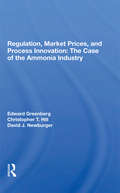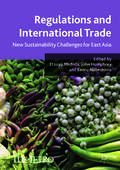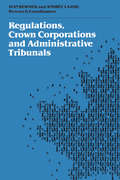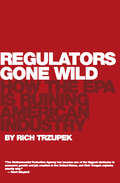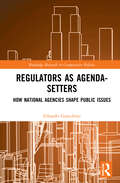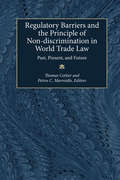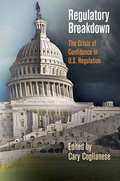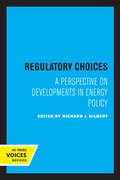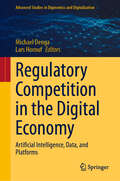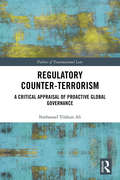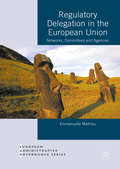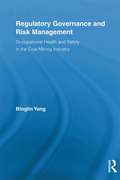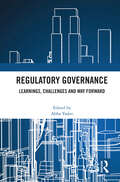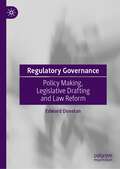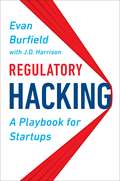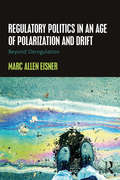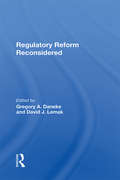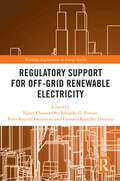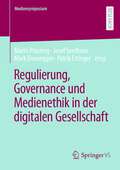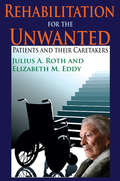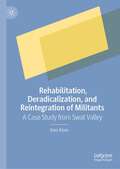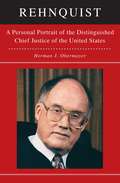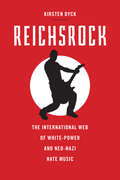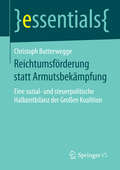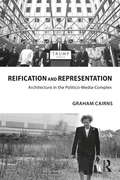- Table View
- List View
Regulation, Market Prices, And Process Innovation: The Case Of The Ammonia Industry
by Edward Greenberg Christopher T. Hill David J. NewburgerThrough the study of innovation in processes for the production of synthetic ammonia, the authors examine the effects of environmental and workplace regulations on business innovation in general. They present a history of ammonia production in the U.S., a survey of government regulation in the industry, and a model of process innovation that combines the economist's production function with the technical and practical concepts of the engineer. Contrary to the widely held view that regulation has an unfortunate impact on business, the authors demonstrate that—at least in one industry—the economic factors of production have a measurable impact on innovation, while regulation does not.
Regulations and International Trade
by Kaoru Nabeshima Etsuyo Michida John HumphreyThis book evaluates the evolution of regulatory policy in advanced countries and discusses how, due to globalization, policy changes in one country have a knock-on effect in others. Separated in two parts, the first half focuses on policy in developed countries and regulatory diffusion from Europe to Asia. The second part looks at the business impact of policy developments in a number of Southeast Asian countries. Key chapters discuss Thailand's response to EU chemical regulations, the diffusion of private food standards, and the effect of chemical safety standards in Malaysia and Vietnam. These contributions are written by leading scholars in the field and the book is likely to be of interest to students, researchers and policy makers concerned with regulation changes in East Asia.
Regulations, Crown Corporations and Adminstrative Tribunals: Royal Commission
by Ivan Bernier Andrée LajoieThis is the third of six volumes dealing with Law, Society and the Economy (see list in back of book), included in the Collected Research Studies of the Royal Commission on the Economic Union and Development Prospects for Canada.This volume surveys administrative law in its various manifestations and considers new themes and issues that are likely to affect the subject. Challenging generally accepted views, the contributors discuss such topics as the structures and processes of Canadian administrative tribunals, Crown corporations as an instrument of economic intervention, and the use of delegated legislation as the preferred instrument of government regulations.
Regulators Gone Wild
by Rich TrzupekRich Trzupek has spent over 25 years engaged in combat with the environmental movement on the front lines, helping America's industrial sector defend itself against the increasingly aggressive tactics that environmental advocacy groups and their allies in the Environmental Protection Agency employ. In Regulators Gone Wild Trzupek lays out the inside story that describes the way the green/big government alliance has combined to stifle American productivity and hamstring American innovation, not by design, but as the inevitable consequence of pursuing a utopian vision of environmental purity that can never, ever be realized.As a respected scientist and consultant, Rich Trzupek has been employed by some of America's largest corporations and by some of its smallest, most innovative entrepreneurs. Those experiences have provided him with a unique perspective. While many of his colleagues in the industrial consulting community only consider the short-term profit opportunities that an overly aggressive EPA provides them, Trzupek takes a longer view. If the EPA continues to hamstring America's ability to create wealth, everyone loses.When it comes to today's environmental issues, most of the public's attention is focused on the issue of "climate change" and initiatives to reduce fossil fuel use and greenhouse gas emissions. As a climate change skeptic, Trzupek argues against these measures, but he sees the rise of this issue as another inevitable step in a progression that spans four decades during which the green movement has continually sought new ways to control industry and the EPA has always happily obliged them. Attempts to restrict America's use of cheap, plentiful coal and stop oil exploration are just the latest examples of regulators gone wild.
Regulators as Agenda-Setters: How National Agencies Shape Public Issues (Routledge Research in Comparative Politics)
by Edoardo GuaschinoThis book provides a comprehensive understanding of how, and under which conditions, regulators in the social sectors are able to influence political agendas and issue definitions. In these political processes, agencies may become the policy entrepreneurs which are able to prioritize issues, placing them in the political agenda and influencing policy formulations. These activities generate additional questions about the political role of regulatory agencies and post-delegation settings. Based on original source data and a mixed methods approach, the book shows that the diffusion of regulatory agencies is not only limited to regulatory responsibilities and to their increasing role in policy-making, but their influence has stretched over the agenda-setting phase but only under certain conditions. Moreover, the evolution of their strategies, the production and use of knowledge and the context in which they operate enable them to exert leverage on agendas. This book will be of key interest to scholars, students and practitioners of the politics of regulation, bureaucracy, agenda-setting, public policy, social problems and more broadly to European and comparative politics, and democracy.
Regulatory Barriers and the Principle of Non-Discrimination in World Trade Law
by Thomas Cottier Petros C. MavroidisThe University of Michigan Press is pleased to announce the second volume in an annual series, the World Trade Forum. The Forum's members include scholars, lawyers, and government and business practitioners working in the area of international trade, law, and policy. They meet annually to discuss integration issues in international economic relations, focusing on a new theme each year. The World Trade Forum 1998 deals with the issue of regulatory barriers. Contributors focus their attention on the implications that government intervention has on the principle of nondiscrimination, the cornerstone of the World Trade Organization. The chapters, which cover both the positive and the normative level, deal in particular with the issue of "like product" definition, and with mutual recognition agreements. The relevant WTO case law is presented and analyzed, and the roundtable discussions are primarily aimed at clarifying to what extent a constitutional function should be assigned to the WTO organs, if at all. Contributors include: Christoph Bail, Jacques Bourgeois, Marco Bronckers, Thomas Cottier, William Davey, Paul Demaret, Piet Eeckhout, Crawford Falconer, Olivier Guillod, Meinhard Hilf, Gary Horlick, Robert Howse, Robert Hudec, Patrick Low, Aaditya Mattoo, Petros C. Mavroidis, Patrick Messerlin, Damien Neven, Kalypso Nicolaidis, David Palmeter, Ernst Ulrich Petresmann, Andre Sapir, and Michel Waelbroeck. Thomas Cottier is Professor of Law, Institute of European and International Economic Law, University of Bern Law School. Petros C. Mavroidis is Professor of Law, University of Neuchâtel.
Regulatory Breakdown
by Cary CoglianeseRegulatory Breakdown: The Crisis of Confidence in U.S. Regulation brings fresh insight and analytic rigor to what has become one of the most contested domains of American domestic politics. Critics from the left blame lax regulation for the housing meltdown and financial crisis--not to mention major public health disasters ranging from the Gulf Coast oil spill to the Upper Big Branch Mine explosion. At the same time, critics on the right disparage an excessively strict and costly regulatory system for hampering economic recovery. With such polarized accounts of regulation and its performance, the nation needs now more than ever the kind of dispassionate, rigorous scholarship found in this book.With chapters written by some of the nation's foremost economists, political scientists, and legal scholars, Regulatory Breakdown brings clarity to the heated debate over regulation by dissecting the disparate causes of the current crisis as well as analyzing promising solutions to what ails the U.S. regulatory system. This volume shows policymakers, researchers, and the public why they need to question conventional wisdom about regulation--whether from the left or the right--and demonstrates the value of undertaking systematic analysis before adopting policy reforms in the wake of disaster.
Regulatory Choices: A Perspective on Developments in Energy Policy
by Richard J. GilbertRegulatory Choices offers the first comprehensive economic history of energy policy and its consequences for California, where some of the most innovative and far-ranging programs of regulatory reform have originated. The authors of this volume have gathered together an impressive wealth of material about actual policy decisions and their repercussions and have subjected their findings to astute economic analysis. This book will serve for years to come as an invaluable reference on the costs and effects of various energy policies. With its focus on bringing prices in alignment with the true cost of producing power and delivering it to the customer, the first part of the book outlines the issue of setting utility rates and considers some of the proposals to provide regulated industries with incentives to respond to economic and environmental concerns. The problems of energy supply occupy the second part of the book, which includes a survey of the costs of alternative energy sources and estimates of their environmental impacts, as well as a case study of the construction of the Diablo Canyon nuclear power plant. The book concludes by documenting the results of subsidy programs that were designed to target the development of wind power and residential energy conservation. Regulators, we learn, have a mixed record when it comes to managing the production of energy. Some conservation programs have enjoyed considerable economic success, particularly those that correct a lack of consumer information. Others, such as the renewable energy tax credits or programs designed to subsidize new technologies, have cost much more than the value of the energy they have saved. What emerges clearly from this study is that regulated industries are not immune from the forces of competition. This title is part of UC Press's Voices Revived program, which commemorates University of California Press’s mission to seek out and cultivate the brightest minds and give them voice, reach, and impact. Drawing on a backlist dating to 1893, Voices Revived makes high-quality, peer-reviewed scholarship accessible once again using print-on-demand technology. This title was originally published in 1991.
Regulatory Competition in the Digital Economy: Artificial Intelligence, Data, and Platforms (Advanced Studies in Diginomics and Digitalization)
by Lars Hornuf Michael DengaThe digital economy is reinvigorating regulatory competition, yet little is known about which rules and jurisdictions can effectively bind companies nor what competitive motivations underlie certain rules. In addition to purely economic motives, legislators are now also driving the pursuit of digital sovereignty and the enforcement of social values in digital spaces. It also remains unclear what regulatory weight the self-regulation of private companies has in multi-level governance systems. This book examines regulatory competition in the three main pillars of digital markets: artificial intelligence, data, and platforms. It brings together legal scholars, economists and information systems experts, providing relevant examples and structured analysis of the aims and outcomes of regulatory competition in the digital economy. “A timely exploration of the balancing acts regulators must perform to manage private power in a globalized digital economy. Essential for understanding the intersection of law, economics, and technology in the contemporary digital ecosystem.” Jens Frankenreiter, Associate Professor of Law, Washington University “The book by Denga and Hornuf provides a comprehensive and timely exploration of the intricate regulatory challenges posed by big data, artificial intelligence, and platforms in the Digital Single Market. If offers critical insights for policymakers, scholars, and businesses navigating this evolving landscape.” Philipp Hacker, Professor for Law and Ethics of the Digital Society, European University Viadrin “Artificial Intelligence is fundamentally disrupting how we enable economic growth and how we regulate fair competition. Luckily, Denga and Hornuf provide a detailed and comprehensive overview of the thorniest and most complex regulatory issues while at the same time offering thoughtful and feasible solutions. "Regulatory Competition in the Digital Economy" is a treasure trove for anyone interested in market regulation, fair competition, consumer protection, and geopolitical questions.” Sandra Wachter, Professor of Technology and Regulation, Oxford Internet Institute
Regulatory Counter-Terrorism: A Critical Appraisal of Proactive Global Governance (Politics of Transnational Law)
by Nathanael Tilahun AliRegulatory Counter-Terrorism explores an emerging terrain in which the global governance of terrorism is expanding. This terrain is that of proactive regulatory governance – the management of the day-to-day activities of individuals and entities in order to pre-emptively minimize vulnerability to terrorism. Overshadowed by the more publicized dimensions of military and criminal justice responses to terrorism, regulatory counter-terrorism has grown in size and impact without stirring up as much academic debate. Through a critical assessment of international regulatory counter-terrorism in three areas – financial services, the control of arms and dangerous materials, and the cross-border movement of persons and goods – this volume identifies a dynamic trend. This is the refashioning of international rule making into a flexible and experimental exercise. This volume shows how this transformation is affecting societies across the world in new ways and in the process unravelling settled understandings of international law. Furthermore, through an in-depth analysis of the working processes of UN counter-terrorism bodies and the Financial Action Task Force, this book illustrates that the monitoring of the global counter-terrorism regime is, contrary to accepted understanding, in the main collaborative and managerial, and coercive only peripherally. Dynamic rule making and soft monitoring complement each other, but this is a reason for concern: the softening of international monitoring encourages regulatory adventurism by states in tackling terrorism, while the element of self-correction in dynamic rule making helps silence the calls for institutionalized mechanisms of accountability. This volume will be of great interest to students and scholars of counter-terrorism, security studies, global governance, and international law.
Regulatory Delegation in the European Union
by Emmanuelle MathieuThis book addresses the regulatory capacity of the EU as it responds to the huge challenge of realizing the single market. It explores its weaknesses, the EU regulatory networks, expert committees and EU agencies formed in response, and the exceptionally large and complex transnational regulatory system which has resulted. It defines the EU regulatory space as a multi-faceted phenomenon of institutional expansion whose shape varies across sectors and changes over time. Empirically based on the exploration of how regulatory delegation has emerged and evolved in three key EU policies (food safety, electricity, and telecommunications), the book disentangles and links together the functional, institutional and power-distributional factors and their interplay over time into a unified explanation of the many faces of the EU regulatory space.
Regulatory Governance and Risk Management: Occupational Health and Safety in the Coal Mining Industry (Routledge Advances in Management and Business Studies)
by Binglin YangRegulatory Governance and Risk Management will be the first book addressing the diffusion of risk-based governance in the coal mining industry from a health and safety standpoint. More specifically, it aims to understand a puzzling phenomenon. Since the 1990s, the approach of risk-based governance has been widely adopted in almost all developed countries in Europe and commonwealth countries. It, however, has diffused much more slowly in the U.S. Using a diffusion approach and comparisons between Australia and the U.S., this book examines mechanisms that both drive and prevent the diffusion of risk-based governance in the coal mining industry. This book has two major selling points. First, this is a timely work given the Upper Big Branch coal mine explosion occurred in April, 2010. After this disaster, many asked why an enhanced level of enforcement after 2006 has not prevented catastrophic accidents from occurring and why risk-based governance, which helps other countries achieve better safety performance, has been largely ignored in the U.S. This book answers these questions and makes recommendations on how to remove barriers in moving toward risk-based governance. Second, this book is readable because it embeds theories into storytelling and gives particular emphasis on the influence of key strategic individuals.
Regulatory Governance: Learnings, Challenges and Way Forward
by Abha YadavThis book explores the role of regulatory bodies and their emergence as the fourth branch of governments. It brings together professionals, academicians, and experts working in regulatory sector to present a foundational text on regulatory regime in India. From case studies to theoretical interventions, the book brings together a wide range of insights on an important but often neglected aspect of governance. It examines a range of themes including, the need for regulatory policy in a post-Covid world, regulatory excellence, impact of regulatory assessments, regulation of hazard, competition commissions, regulation of digital assets, stakeholder interests and investor activism, and anti-trust laws.The volume will be of great interest to scholars and researchers of law and governance, public policy and South Asian studies.
Regulatory Governance: Policy Making, Legislative Drafting and Law Reform
by Edward DonelanThis book describes how governments formulate policies, draft legislation, and manage stocks of legislation and how approaches to these tasks are converging. That convergence has developed over 30 years through the work by the OECD in its studies on regulatory reform and the work of other international organizations to improve regulatory management. The Institutions of the European Union and its member states, OECD member countries and a growing number of developing and transitional countries have developed a policy best described as ‘Better Regulation.’ That policy is characterized using regulatory impact assessment, improving public consultation, and reducing administrative burdens. The policy has brought improvements in legislative drafting and managing stocks of legislation. The book concludes with a description of the impact of information technology on governments and how the challenges posed by the Internet, globalization and pandemics are being met by new approaches to regulating to ensure its benefits exceed its costs.
Regulatory Hacking: A Playbook for Startups
by Evan Burfield J. D. HarrisonEvery startup wants to change the world. But the ones who truly make an impact know something the others don't: how to make government and regulation work for them.As startups use technology to shape the way we live, work, and learn, they're taking on challenges in sectors like healthcare, infrastructure, and education, where failure is far more consequential than a humorous chat with Siri or the wrong package on your doorstep. These startups inevitably have to face governments responsible for protecting citizens through regulation. Love it or hate it, we're entering the next era of the digital revolution: the Regulatory Era.The big winners in this era--in terms of both impact and financial return--will need skills they won't teach you in business school or most startup incubators: how to scale a business in an industry deeply intertwined with government.Here, for the first time, is the playbook on how to win the regulatory era. "Regulatory hacking" doesn't mean "cutting through red tape"; it's really about finding a creative, strategic approach to navigating complex markets.Evan Burfield is the cofounder of 1776, a Washington, DC-based venture capital firm and incubator specializing in regulated industries. Burfield has coached startups on how to understand, adapt to, and influence government regulation. Now, in Regulatory Hacking, he draws on that expertise and real startup success stories to show you how to do the same. For instance, you'll learn how... * AirBnB rallied a grassroots movement to vote No on San Francisco's Prop F, which would have restricted its business in the city. * HopSkipDrive overcame safety concerns about its kids' ridesharing service by working with state government to build trust into its platform. * 23andMe survived the FDA's order to stop selling its genetic testing kits by building trusted relationships with scientists who could influence the federal regulatory community.Through fascinating case studies and interviews with startup founders, Burfield shows you how to build a compelling narrative for your startup, use it to build a grassroots movement to impact regulation, and develop influence to overcome entrenched relationships between incumbents and governments. These are just some of the tools in the book that you'll need to win the next frontier of innovation.
Regulatory Politics in an Age of Polarization and Drift: Beyond Deregulation
by Marc Allen EisnerRegulatory change is typically understood as a response to significant crises like the Great Depression, or salient events that focus public attention, like Earth Day 1970. Without discounting the importance of these kinds of events, change often assumes more gradual and less visible forms. But how do we ‘see’ change, and what institutions and processes are behind it? In this book, author Marc Eisner brings these questions to bear on the analysis of regulatory change, walking the reader through a clear-eyed and careful examination of: the dynamics of regulatory change since the 1970s social regulation and institutional design forms of gradual change – including conversion, layering, and drift gridlock, polarization, and the privatization of regulation financial collapse and the anatomy of regulatory failure Demonstrating that transparency and accountability – the hallmarks of public regulation – are increasingly absent, and that deregulation was but one factor in our most recent significant financial collapse, the Great Recession, this book urges readers to look beyond deregulation and consider the broader political implications for our current system of voluntary participation in regulatory programs and the proliferation of public-private partnerships. This book provides an accessible introduction to the complex topic of regulatory politics, ideal for upper-level and graduate courses on regulation, government and business, bureaucratic politics, and public policy.
Regulatory Reform Reconsidered
by Gregory A Daneke David J Lemak Charles L Kennedy Gerald BarkdollBringing together a broad group of leading scholars, government officials, and corporate representatives, this book provides a critical analysis of recent regulatory reform efforts. The contributors focus on social and environmental regulation as they evaluate problems of costly and ineffective regulatory measures. They argue that, although some pr
Regulatory Support for Off-Grid Renewable Electricity (Routledge Explorations in Energy Studies)
by Ngozi Chinwa Ole, Eduardo G. Pereira, Peter Kayode Oniemola, and Gustavo Kaercher LoureiroThis book investigates the role of law in enabling and addressing the barriers to the development of off-grid renewable electricity (OGRE). The limited development of OGRE is ascribed to a host of social, economic, and legal barriers, including the problem of initial capital costs, existing subsidies for conventional electricity, and lack of technological and institutional capacity. Through the analyses of selected case studies from Africa, Asia, Europe and North and South America, this book discusses the typical barriers to the development of OGRE from a global perspective and examines the role of the law in addressing them. Drawing together the lessons learnt from the case studies, this book offers robust recommendations on how the development of OGRE will support the goal of achieving universal access to low carbon, reliable, and sustainable electricity globally. This volume will be of great interest to students, scholars, policy makers, investors, and practitioners in the fields of energy law and policy, climate change, and renewable energy development.
Regulierung, Governance und Medienethik in der digitalen Gesellschaft (Mediensymposium)
by Patrik Ettinger Mark Eisenegger Marlis Prinzing Josef SeethalerUnsere stark von netzbasierten und global verflochtenen Machtstrukturen geprägten Gesellschaften offenbaren angesichts globaler Herausforderungen und Krisen (u.a. menschengemachter Klimawandel; Corona-Pandemie; Big Data und Überwachung) ungelöste Fragen zu Ethik und Regulierung der öffentlichen Kommunikation, zu deren Klärung die Kommunikations- und Medienwissenschaft einiges beitragen kann. Die Pandemie beispielsweise ist unter anderem eine kommunikative Herausforderung, an der sich die prägende Bedeutung eines ethischen Kompasses für die Orientierung und Qualität von Journalismus erweist. Für demokratische Gesellschaften bleibt der öffentliche Diskurs zwar konstitutiv, aber zugleich gewinnt die Fähigkeit, mit Dissonanz und Streit umzugehen, immer mehr an Bedeutung. Die Beiträge des Bands befassen sich mit Theoriebildung und Normsetzung, Regulierungs- und Governancestrukturen, Regulierungsinhalten und Regulierungsherausforderungen, sowie mit Überlegungen zu einer Neujustierung der Kommunikations- und Medienethik.
Rehabilitation for the Unwanted: Patients and Their Caretakers
by Elizabeth Eddy Julius RothThis book is a study detailing what happens to people and what life is like in a rehabilitation program. The program discussed is embedded in an institution, called ""Farewell Hospital"" by the authors, that was designed to fill a demand for facilities for those judged unable to live on their own. Due to physical or mental handicaps and no family, friends, or other social agents who are willing to make a home for them outside of a public institution, these patients were placed in a rehabilitation unit.Most patients were placed with the rehabilitation unit as a brief interlude before their permanent placement in the custodial unit of the vast institution where they would live out their lives. This work deals with the question of what happens to patients once they are rehabilitated and the non-therapeutic rules and practices of the health and welfare structure of which they are a part. In this case, the rehabilitation specialists and ward workers set themselves the task of improving the life chances of their clients by treating their ailments when possible and by improving their physical functioning so that they were better able to care for their own needs.The authors examine the effects of the organizational relationships on rehabilitation outcomes and on the lives of the people who make hospitals their home. The text attempts to sustain feeling for the historical context of their study the ""problem"" of larger numbers of disabled, poverty-stricken persons, who are no longer wanted by anyone and asserts that a ""solution"" must be found.
Rehabilitation, Deradicalization, and Reintegration of Militants: A Case Study from Swat Valley
by Ilam KhanThis ethnographic study focuses on post-conflict rehabilitation in Pakistan's Swat valley, addressing deradicalization, rehabilitation and reintegration in the context of militancy and counter-militancy. It provides a theoretical framework for rehabilitation, emphasizing disarmament, demobilization, and reintegration (DDR) and introduces the concepts of controlled environment, controlled society, and controlled rehabilitation within Swat's unique context. The book categorizes the drivers of militancy, revealing distinctions from conventional perspectives. It also assesses the challenges of reintegrating ex-combatants and explores the compatibility of restorative justice (RJ) with Pashtunwali, the traditional Pashtun legal system. The book is useful for researchers focusing Pashtun region, post-conflict interventionists, and peace and conflict scholars, this book offers valuable insights into the intricacies of this critical region's rehabilitation and counter-militancy efforts.
Rehnquist
by Herman Obermayer"This book is a final act of posthumous loyalty. Without it, history will have an incomplete -- and I believe unbalanced -- picture of the remarkable man who was the sixteenth chief justice of the United States, a man I was proud to call my friend." The impact of Chief Justice William Rehnquist -- who served as a Supreme Court justice for a third of a century and headed the federal judiciary under four presidents -- cannot be overstated. His dissenting opinion in Roe v. Wade, and his strongly stated positions on issues as various as freedom of the press, school prayer, and civil rights, would guarantee his memory on their own. Chiefly, though, William Rehnquist will always be remembered for his highly visible role in two of the most important and contentious political events of recent American history: the impeachment trial of President Bill Clinton in 1999 and the Supreme Court's decision that made George W. Bush the victor in the presidential election of 2000. Despite his importance as a public figure, however, William Rehnquist scrupulously preserved his private life. And while his judicial opinions often inflamed passions and aroused both ire and praise, they were rarely personal. The underlying quirks, foibles, and eccentricities of the man were always under wraps. Now, however, journalist Herman J. Obermayer has broken that silence in a memoir of their nineteen-year friendship that is both factually detailed and intensely moving, his own personal tribute to his dearest friend. In these pages, we meet for the first time William Rehnquist the man, in a portrait that can only serve to enhance the legacy of a Chief Justice who will be remembered in history as being among America's most influential.
Reichsrock: The International Web of White-Power and Neo-Nazi Hate Music
by Kirsten DyckFrom rap to folk to punk, music has often sought to shape its listeners' political views, uniting them as a global community and inspiring them to take action. Yet the rallying potential of music can also be harnessed for sinister ends. As this groundbreaking new book reveals, white-power music has served as a key recruiting tool for neo-Nazi and racist hate groups worldwide. Reichsrock shines a light on the international white-power music industry, the fandoms it has spawned, and the virulently racist beliefs it perpetuates. Kirsten Dyck not only investigates how white-power bands and their fans have used the internet to spread their message globally, but also considers how distinctly local white-power scenes have emerged in Western Europe, Eastern Europe, Latin America, the United States, and many other sites. While exploring how white-power bands draw from a common well of nationalist, racist, and neo-Nazi ideologies, the book thus also illuminates how white-power musicians adapt their music to different locations, many of which have their own terms for defining whiteness and racial otherness. Closely tracking the online presence of white-power musicians and their fans, Dyck analyzes the virtual forums and media they use to articulate their hateful rhetoric. This book also demonstrates how this fandom has sparked spectacular violence in the real world, from bombings to mass shootings. Reichsrock thus sounds an urgent message about a global menace.
Reichtumsförderung statt Armutsbekämpfung: Eine sozial- und steuerpolitische Halbzeitbilanz der Großen Koalition (essentials)
by Christoph ButterweggeChristoph Butterwegge zeigt am Beispiel des Rentenpaketes, der Mindestlohngesetzgebung und der jüngsten Erbschaftsteuerreform zugunsten von Firmenerben, dass die Regierungspraxis der 3. Großen Koalition aus CDU, CSU und SPD bis zur Hälfte der laufenden Legislaturperiode weder geeignet war, die Armut zu lindern, noch das Problem der sozialen Polarisierung zu lösen. CDU, CSU und SPD sind für die zunehmende Spaltung des Landes in Arm und Reich nicht einmal sensibel, wie der Koalitionsvertrag unter dem Motto ,,Deutschlands Zukunft gestalten" belegt. Obwohl die Regierungsparteien stolz verkünden, einen Großteil ihres gemeinsamen Programms für die 18. Legislaturperiode bereits verwirklicht zu haben, fällt die Erfolgsbilanz hinsichtlich der Verringerung und Verhinderung von Armut im wohlhabenden, wenn nicht reichen Deutschland nach Ansicht des Autors eher dürftig aus.
Reification and Representation: Architecture in the Politico-Media-Complex (Routledge Research in Architecture)
by Graham CairnsThe relationship between politics and the public relations industry is controversial and, at times, polemic. However, one component of this relationship that has yet to be investigated is the role of architecture. Arguing for a fundamental reconfiguration of our understanding of ‘political architecture’, this book suggests it is not only a question of constructed buildings, but equally a case of mediated imagery. Considered through examples of architecture as a backdrop for photo shoots by politicians in the democracies of the United States and the United Kingdom, this book suggests these images give us both a better understanding of recent developments in the Western political economy and the architectural and urban developments of the late 20th and early 21st Centuries. Using case studies of Margaret Thatcher, Tony Blair, David Cameron, Barack Obama, George W. Bush and Donald Trump, this book represents a ground-breaking triangular analysis that will be essential reading for scholars in architecture, politics, media and communication studies.
